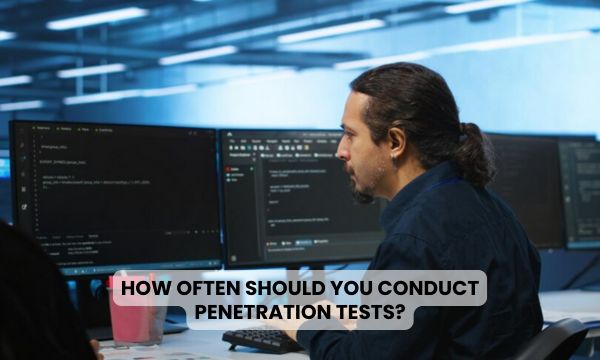
Cyber threats evolve rapidly, and as technology advances, so do the methods of attackers. One of the most effective ways to stay ahead of these threats is through penetration testing (pentesting), which simulates real-world attacks to identify vulnerabilities before they are exploited. But how often should your organization perform these tests? The frequency of pentesting depends on various factors, including your industry, the sensitivity of your data, and compliance requirements.
In this blog, we will explore the optimal frequency of penetration testing across different industries and why regular testing is crucial to maintaining a secure infrastructure.
Industry-Specific Recommendations for Penetration Testing Frequency
1. Healthcare Sector: Every 6 Months to Annually
Healthcare organizations handle highly sensitive Protected Health Information (PHI), making them a top target for cybercriminals. Due to regulations like HIPAA and the high cost of healthcare data breaches (averaging $10.93 million per incident according to IBM's 2022 Cost of a Data Breach Report), regular penetration testing is critical.
Recommendation:
Healthcare providers should conduct penetration tests at least annually and preferably every 6 months, especially after significant changes in systems or software. Regular testing ensures compliance with HIPAA and strengthens defences against data breaches.
2. Financial Services: Quarterly to Biannually
Financial institutions face constant threats from cybercriminals seeking to exploit vulnerabilities in online banking platforms, mobile apps, and payment systems. Compliance with frameworks like PCI DSS and SOX often mandates regular security testing.
Recommendation:
Financial organizations should conduct penetration tests quarterly or biannually to comply with industry regulations and ensure the security of customer financial data. High-value targets such as payment systems and customer-facing applications should be tested more frequently.
3. Government Sector: Annually or After Major Changes
Government agencies handle a wide array of sensitive data, from personal information to classified data, making them prime targets for Advanced Persistent Threats (APTs) and nation-state attackers. Compliance with standards like NIST and FISMA is critical in ensuring the security of government infrastructure.
Recommendation:
Government organizations should conduct penetration tests annually, with additional tests after major system changes or updates to mission-critical applications. Regular testing is crucial given the rising frequency of cyberattacks on public sector institutions.
4. Manufacturing and Critical Infrastructure: Annually
The manufacturing sector, especially those involved in critical infrastructure such as energy, utilities, and transportation, is vulnerable to cyberattacks aimed at disrupting operations. A breach in these industries could have severe financial, safety, and even national security implications.
Recommendation:
Manufacturing companies, especially those managing operational technology (OT), should conduct penetration testing annually, with additional tests for systems exposed to the public internet or if there have been significant infrastructure changes.
5. SaaS and Tech Companies: Biannually to Quarterly
For SaaS companies and tech providers, customer data and cloud infrastructure are among their most valuable assets. Given the fast pace of software development and frequent system updates, vulnerabilities can quickly emerge.
Recommendation:
SaaS providers should conduct penetration tests biannually or quarterly, particularly after major product releases or updates. This ensures that new features and integrations are secure and that customer data remains protected.
6. Startups: Annually or Before Major Launches
Startups often face budget constraints, but neglecting cybersecurity can lead to devastating breaches that could derail the business. In the early stages of growth, startups may handle sensitive customer information or intellectual property that is vulnerable to attack.
Recommendation:
Startups should conduct penetration testing annually, with additional tests before major product launches or significant updates. Opting for cost-effective VAPT solutions can provide the necessary protection while staying within budget.
Why Regular Penetration Testing is Essential
1. Mitigating Emerging Threats
Cybercriminals constantly adapt their tactics, exploiting new vulnerabilities that arise as systems evolve. Regular penetration testing allows organizations to stay ahead of these threats by identifying and remediating security gaps in real time. A test conducted a year ago may no longer reflect the current threat landscape, especially given the rapid pace of technological change.
2. Compliance and Regulatory Requirements
Many industries are subject to strict cybersecurity regulations, such as GDPR, HIPAA, PCI DSS, and SOX, which require regular security assessments, including penetration tests. Non-compliance can result in significant fines and damage to your organization's reputation. Regular testing ensures compliance with these regulations and helps avoid costly penalties.
3. Assessing Security After System Updates or Changes
Any significant changes to your infrastructure, such as new software implementations, updates to applications, or changes to network configurations, can introduce new vulnerabilities. Conducting penetration tests after these changes ensures that the new environment remains secure and that no new risks have been introduced.
4. Reducing the Risk of Data Breaches
Data breaches not only cause financial loss but also erode customer trust and damage reputations. By identifying vulnerabilities early through regular testing, organizations can mitigate the risk of data breaches and protect their critical assets.
5. Demonstrating Due Diligence to Stakeholders
Regular penetration testing demonstrates a commitment to cybersecurity to customers, regulators, and investors. It shows that your organization takes proactive steps to protect data and comply with industry standards, fostering trust and confidence in your business.
Conclusion: Tailoring Penetration Testing to Your Industry
The frequency of penetration testing should align with the unique needs of your industry, the sensitivity of your data, and the regulatory requirements you must meet. Whether you’re in healthcare, finance, government, or SaaS, regular testing is crucial to maintaining a secure and resilient infrastructure.
By performing penetration tests at the recommended intervals and following up with immediate remediation, your organization can stay ahead of emerging threats, ensure compliance, and protect valuable data from cybercriminals.
Need help determining how often your organization should conduct penetration tests? Contact us today to schedule a consultation and ensure your infrastructure remains secure year-round.



